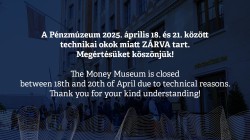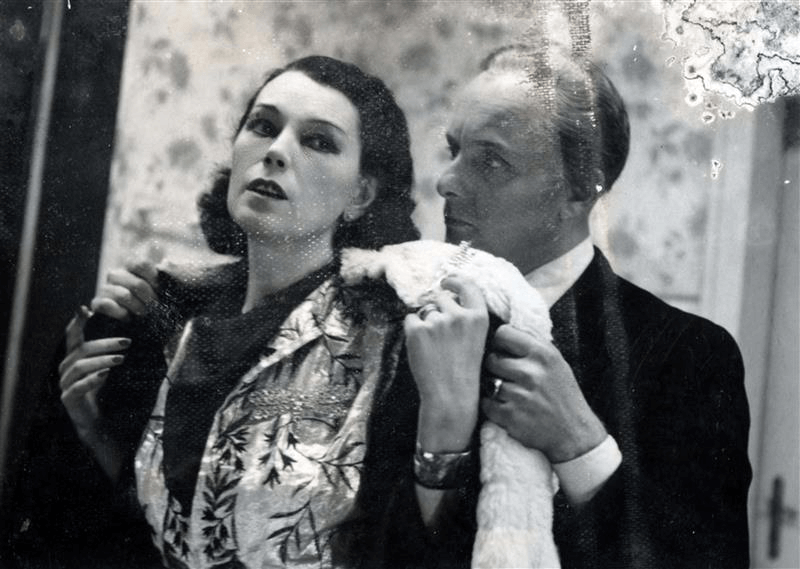
The capital's food problem was waiting for a solution in the last year of World War II, which was solved with a special security, the loan tickets. These were not intended to be used as money, but they became a means of payment to a limited extent. Katalin Karády and Gizi Bajor also took part in their promotion.
The problem
In the first months of 1945, the provision of public care became absolutely vital. Strict restrictions, austerity, head rations, bans and ticketing failed to the problem. The food reserves were all gone. In this situation, the government entrusted Zoltán Vas with the task of public care. His task also included the purchase, collection and distribution of food in Budapest and its area of agglomeration, but no money was available for the job. Thus, they turned to the inhabitants of the city for a solution. In order to obtain banknotes from the hands of the public and to restart the stalled cash flow, the Budapest National Committee issued 50 million pengő worth of ration coupons. The new notes were backed by the real and personal property and income of the capital city itself.
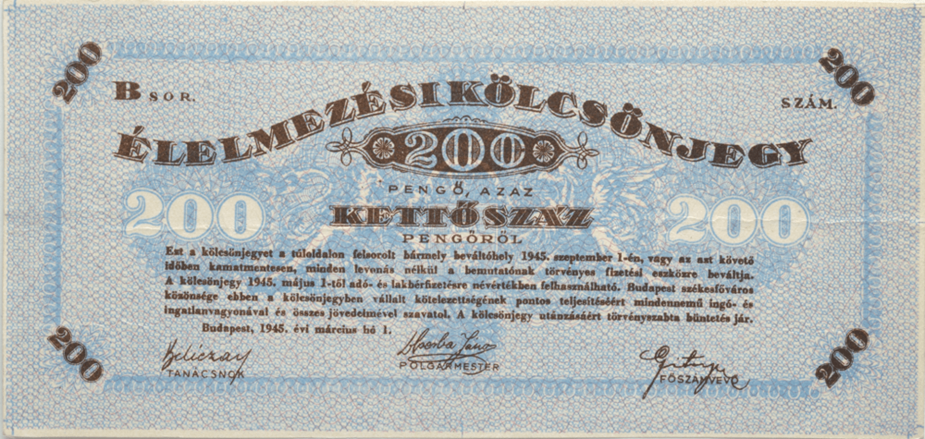
The denominations
The interest-free loan notes were printed by Székesfővárosi Nyomda. They were also provided with a penalty clause similar to that for banknotes to prevent counterfeiting. The original intention was to put into circulation denominations of 100, 200 and 500 pengő. To be on the safe side, only the two smaller denominations were issued at first, the 500 was left out because it was considered a high denomination at the time. Instead, 50 pengő banknotes were issued as a substitute, to the value of 20 million pengő, in order to get the smaller banknotes from the public as well. This did not increase the amount of the internal loan, because 200 and 500 pengő notes of the same value were blocked. Coincidentally, the five hundred notes were nevertheless given out to a financial institution by mistake. With the exception of the latter, all the food loan notes were redeemed by the capital between 1 September and 31 December in 1945.
The ticket system
Like securities, tickets had to be subscribed for by the 25th of April. In fact, it was possible to subscribe before the printed tickets were ready, through a temporary receipt, at financial institutions in Budapest. Redemption was to be affected free of interest and without deductions by the financial institutions, post office savings banks, tax offices and other institutions where the tickets were put into circulation. The amount collected was administered by the Government Commissioner for Public Supply who created the tickets. The earned sum was used to buy food in the countryside. Ticketing was to be considered as a public work for reconstruction.
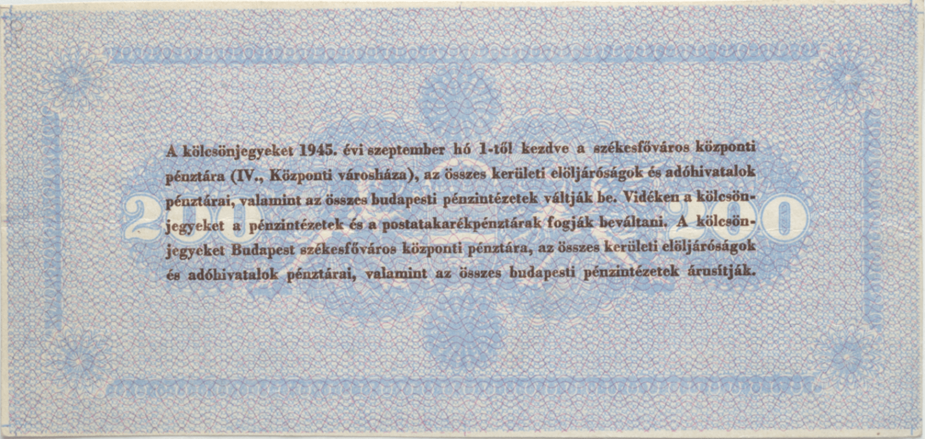
The promotion
All available means have been used to promote the tickets. Village notices, posters, newspapers, etc., these outlets explained the need for tickets and their benefits. Several stage performances were held in the Opera House, and the most popular artists of the time were attracted: actresses Katalin Karády, Gizi Bajor, opera singer Mihály Székely, who agreed to perform without remuneration. The price of the ground floor and box tickets was 120 pengő, for which the spectator received a 100 pengő food loan note, so in the end the spectator could watch the performance for 20 pengő. At that time in Budapest, daily newspapers cost 60 pengő, 1 kg of flour 65-80, 1 kg of bread 80, 1 egg 5-7.60 pengő. The trade unions, factories and companies were at the forefront of the rationing, holding campaigns such as football matches, where the proceeds were donated by sports clubs to the loan effort.
Redeeming
The redemption of the tickets was arranged so that they could be used to pay taxes and rent from the 1st of May to the 31st of December in 1945. Interestingly, only 4 million pengő in loan notes were used to pay taxes. It was also used to buy limited amounts of groceries in designated shops, thus giving the tickets a function similar to money. People were obliged to pay the money returned from the loan tickets in cash. Loan tickets were even used in private transactions, but people typically preferred to pay with loan tickets rather than accept them.
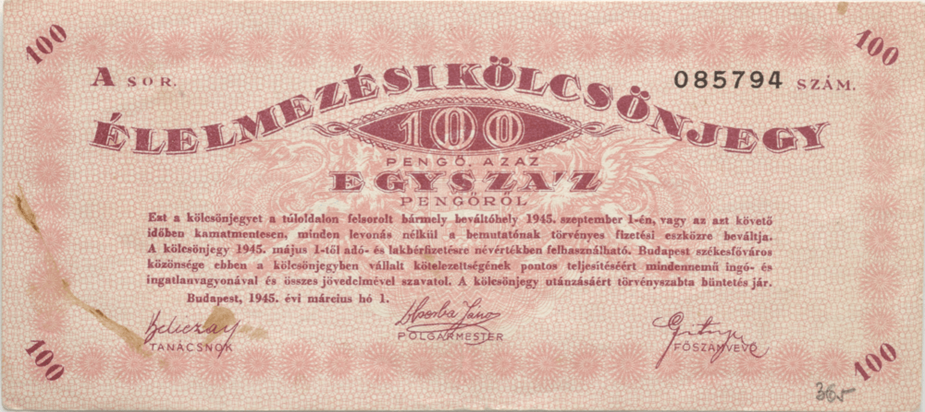
The effectiveness
The success of the food ration ticket scheme has received mixed reviews from both contemporary and posterity analysts. Although the expected amount was not reached, a substantial amount of 27.2 million of the planned 50 million was collected. The tickets were successful in kick-starting the cash flow before hyperinflation and, most importantly, in significantly alleviating the capital's food shortages. However, it was the first and only such borrowing scheme in the history of the capital, and nothing similar to it had ever been made.
On the 25th of April in 1945, the last day of the scheme, the MTI gave this assessment of the unique loan tickets, which combined the characteristics of securities and banknotes:
"The history of the subscription and payment of this loan is a testimony to the will of the Hungarian people to live and to the fact that there is no obstacle to the serious financial foundation of the new democratic Hungary."
Further news
All newsThank you for your kind understanding!
The Money Museum has been nominated for the Museum of the Year 2025 award by the Pulszky Society - Hungarian Museum Association jury.
Vote for the Money Museum and the Money Museum Panoramic Terrace!
The competition at the Money Museum is now closed and the winners have been announced.
Thank you for your kind understanding!
The Money Museum has been nominated for the Museum of the Year 2025 award by the Pulszky Society - Hungarian Museum Association jury.
Vote for the Money Museum and the Money Museum Panoramic Terrace!
The competition at the Money Museum is now closed and the winners have been announced.
